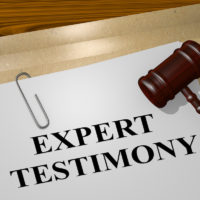How Expert Testimony Can Save or Kill Your New York Medical Malpractice Case

Successfully proving a claim for medical malpractice requires that the plaintiff establish that the physician deviated from appropriate medical standards of behavior. The plaintiff must prove that a reasonable doctor with the skills and training required in their local community would not have acted as the defendant did, and that this deviation caused the plaintiff’s injury. In New York, you need an expert to testify that the doctor acted inappropriately. If your expert fails to show that the defendant acted outside of the community standards of care, then you may lose your case before the jury even gets to make a decision. Continue reading below for details on a recent New York appellate decision detailing the standards for judgment in a medical malpractice case, and reach out to a knowledgeable medical malpractice lawyer at the Law Office of Taran M. Provost, PLLC if you’ve been harmed by medical error.
Expert Testifies Surgery Method Was Not “Preferred” but Was Acceptable
The plaintiff in Feteha v. Scheinman alleged she was injured as a result of a faulty brachioplasty surgery performed by the defendant surgeon. As the appellate court explained, in New York, in order to prove a medical malpractice case, the plaintiff must bring in an expert to testify that the defendant’s conduct deviated from “accepted community standards of practice.” The plaintiff must also show that that deviation was a “proximate cause of the plaintiff’s injuries.”
At the close of the plaintiff’s case at jury trial, before presenting any evidence, the defendant filed a motion for judgment as a matter of law (JAML). A successful JAML motion means that the court will take the case away from the jury and decide the case as a matter of law. In order to succeed on a motion for JAML, a defendant must demonstrate that “there is no rational process by which the jury could find in favor of the plaintiff and against the moving defendant,” even taking all of the plaintiff’s evidence as true and drawing all reasonable inferences in their favor.
In Feteha, the court focused on the plaintiff’s medical expert’s admission that while he would not have used the “posterior approach to brachioplasty,” the method was nevertheless “an accepted procedure and is within the standard of care.” The court emphasized that the plaintiff’s expert thus “rendered no testimony establishing the manner in which the defendant’s conduct deviated from the accepted standard of care, as her testimony centered around her preferred method for brachioplasty, which simply differed from the defendant’s approach.” It is not enough for your expert to believe another approach would have been better; they must establish that the medical approach used was outside the acceptable norms within the medical community. Because the plaintiff’s expert admitted that the procedure used was accepted in the medical community, the court determined that the plaintiff had no sustainable medical malpractice claim as a matter of law. The trial court granted judgment for the defendant and the appellate court affirmed.
Call the Law Office of Taran M. Provost, PLLC with Medical Negligence Questions
If you or a loved one was recently harmed due to medical malpractice in the Hudson Valley, please call the experienced Poughkeepsie injury attorneys at the Law Office of Taran M. Provost, PLLC. We have over 40 years of combined experience and have what it takes to represent you aggressively in your medical malpractice lawsuit. Determining whether you have a medical malpractice case can be a complicated task that requires knowledge and experience. Please call us today at 845-675-3243 for a free consultation so that we can help you evaluate your case.
